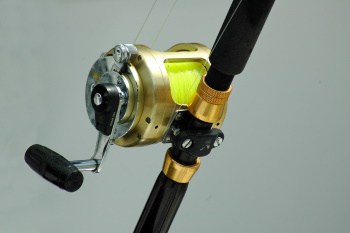If you enjoy fishing both in saltwater and freshwater, you may be wondering if you can use a saltwater rod and reel in freshwater, to save money and/or space. What are the differences? And why or why not can you use them interchangeably? This is what we’ll be exploring.

Can you use saltwater rod and reel in freshwater? Yes, you can use your saltwater rod and reel in freshwater, but you shouldn’t use your freshwater rod and reel in saltwater.
You may be wondering why that is and what the difference even are between the two. Keep reading to learn all the answers.
Why Can You Use a Saltwater Rod and Reel in Freshwater?
You can use any kind of rod and reel you like in any water you like, but you’ll find it easier to catch a fish and prolong your gear’s life if you match rod and reel to water type. However, if you only want to purchase one rod and reel to use for both types of water, go for a saltwater rod and reel.
This is because saltwater rods and reels are designed to withstand the corrosion that saltwater causes. Saltwater reels are sealed to prevent the saltwater from getting into the mechanisms and causing them to corrode from the harsh saltwater. These reels also have different styles than freshwater.
However, saltwater reels are more expensive and heavy. This is because there’s more work involved and more expensive, heavy-duty materials used to make it. Let’s look into the details of both saltwater and freshwater rods and reels.
Where Can You Use a Saltwater Rod and Reel and Why?
Saltwater rods and reels are heavier duty than freshwater rods and reels, which means you can use them in a variety of locations, not just in saltwater. In the section below on freshwater rods, we’ll dive deeper into why you shouldn’t use freshwater rods and reels in saltwater because of their materials.
Saltwater rods and reels can be used in a variety of situations because, very simply, they’re tough. They’re made to withstand the corrosion of salt water, which means they’re made of a special alloy or specially treated.
If saltwater rods are made using cheaper metals, they’re coated with a special sealant to hold the water off the metal and extend its life. This leaves the rod lighter in weight and cost, but still able to perform longer. However, the sealant will begin to chip and may allow corrosion over time.
Why doesn’t everyone use saltwater rods and reels then? It’s simply because saltwater rods and reels are so much more expensive and tend to be heavier. There are more reasons why people don’t use saltwater reels in freshwater, in the following section.
Why Not Use a Saltwater Reel in Freshwater
Some people will tell you that though you can, you shouldn’t use a saltwater reel in freshwater. This doesn’t have anything to do with the durability of the reel, as we know saltwater gear is heavier duty, but with the style and design.
Saltwater and freshwater reels are plentiful, coming in an assortment of shapes and sizes and prices. Saltwater reels will last you longer but may be designed for something you won’t encounter. For instance, saltwater reels typically use heavier line and lures, which isn’t what you want for freshwater.
Most saltwater reels are made for specific situations, a lot of which you won’t encounter during freshwater fishing trips. Freshwater reels are usually three basic types: spinning, spin casting, or baitcasting, while saltwater reels have more variety for different situations.
Saltwater reels are also very expensive. If you’re only going to be in fresh water, there’s no reason to spend so much money on a reel you don’t use to its full extent. And finally, they’re often designed for different styles of casting you’ll only use in ocean fishing.
Where Can You Use a Freshwater Rod and Reel?
The truth is, you can use any rod and reel in any kind of water. However, if you want to prolong the life and quality of your rod and reel, you should be careful when choosing which type of rod and reel you purchase. We’ll first look into where you should use your freshwater gear to prolong its lifespan.
Freshwater rods and reels should be used in freshwater only if you wish to extend their lifespan.
Freshwater rods and reels are cheaper to buy, less heavy to carry around, and are easier to find a great selection of in store. However, they aren’t built to withstand the tough job of saltwater fishing. They’ll typically need to be replaced when used for saltwater fishing at least three times as soon as a saltwater rod needs replaced.
Why You Shouldn’t Use a Freshwater Rod and Reel in Saltwater
As we covered earlier, saltwater rods and reels are built of tougher, heavier duty materials because of the corrosiveness of saltwater versus freshwater. This means that you can use saltwater rods and reels in most any water, as they’re built to handle anything. Freshwater gear is slightly different.
Why to Not Use a Freshwater Rod in Saltwater
Freshwater rods are built of cheaper, lighter materials than saltwater gear is made of. This causes both the price and the weight to be lower, making them easier to afford and carry. This is because they’re typically made with simple metals, which are fine for freshwater.
Simple metals will slowly corrode over time, but they’re inexpensive enough that you can afford to replace them every few years. If you use it in salt water, however, they’ll corrode much faster unless they have a sealant applied to prevent it.
Freshwater rods aren’t usually intended to be used with the more advanced saltwater reels either. Many of these are to cast down deep while on a boat going for the monster fish in the deep. You simply won’t be doing that with a freshwater rod.
Freshwater rods can be tempting to someone new to saltwater fishing because of their lower price. While the rod will last you through several saltwater fishing adventures, you’ll only have to replace it later. You’ll have to replace your rod at some point, but the proper rod will last you at least twice as long.
Why to Not Use a Freshwater Reel in Saltwater
Earlier, we covered why to not use a saltwater reel in freshwater and how they have different setups and designs for your needs. When it comes to using freshwater reels in saltwater, however, there’s another factor involved. This the materials used, just like the freshwater rod.
Freshwater reels are made of the same simple metals as freshwater rods. This causes the same corrosion risk as the rod when used in saltwater. Because of this, most saltwater reels use the same alloys and sealants as saltwater rods do. There’s another solution some saltwater reels present as well.
Some saltwater reels are sealed, as we discussed earlier. This keeps the water out, to prevent corrosion. However, you may be wondering if you can purchase a sealed freshwater reel for cheaper than a saltwater reel and have the same results as buying the special saltwater reel.
The short answer is, no, you will not be able to use a sealed freshwater reel the same as a sealed saltwater reel. This is because the materials used to seal reels for freshwater are the same simple metals that will corrode from saltwater. The outside of your reel will corrode and spread through.
